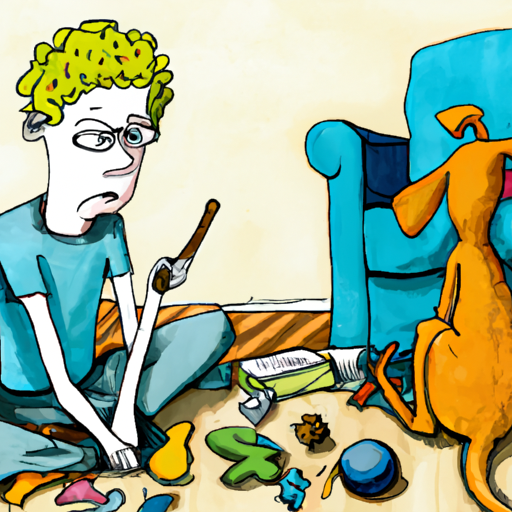As a devoted dog owner, you’ve likely experienced the frustration of coming home to find your favorite pair of shoes destroyed or the corner of your couch chewed to bits. It’s essential to understand that this behavior is a natural part of a dog’s development and not just a mischievous act. So, when do dogs stop chewing up stuff?
- Chewing tendencies in puppies
- Transition to adulthood
- Factors affecting chewing behavior
- Training your dog to stop destructive chewing
- Frequently Asked Questions
Key Takeaways
- Dogs typically outgrow their destructive chewing habits by the time they reach adulthood, around one to two years of age.
- Many factors, including breed, diet, and exercise, can influence a dog’s chewing habits.
- Training and providing chew toys can help manage and eventually eliminate destructive chewing.
Chewing tendencies in puppies
Puppies, much like human babies, go through a teething phase. This period, which typically lasts from about three weeks to six months, can cause discomfort and pain as new teeth push through the gums. Chewing provides relief from this discomfort, and unfortunately, anything within reach can become a chew toy.
According to American Kennel Club, puppies are also very curious and use their mouths to explore their surroundings. This exploration can result in unwanted chewing behavior.
Transition to adulthood
As your puppy grows into an adult dog, usually around the age of one to two years, they will typically outgrow their need to chew for teething reasons. However, this doesn’t mean the chewing will automatically stop. Adult dogs may continue to chew for various reasons, such as boredom, anxiety, or lack of training.
A blog post on OneTopDog provides a detailed guide on understanding and managing chewing behavior in dogs.
Factors affecting chewing behavior
Numerous factors can influence a dog’s chewing habits. Here are a few:
- Breed: Some breeds are more prone to chewing than others. For example, Labrador Retrievers and Golden Retrievers are notorious chewers.
- Diet: Dogs not receiving enough nutrients from their diet may resort to chewing non-food items.
- Exercise: Dogs with high energy levels require more physical activity. A lack of exercise can result in excessive chewing.
- Anxiety: Dogs experiencing separation anxiety may chew household items when left alone.
Check out this OneTopDog article for a more comprehensive look at why dogs chew.
Training your dog to stop destructive chewing
Training your dog to stop chewing on inappropriate items is a process that requires patience and consistency. Here are some steps to help you manage your dog’s chewing habits:
-
Provide chew toys: Chew toys can help satisfy your dog’s natural urge to chew. Ensure these toys are safe and suitable for your dog’s size and chewing strength.
-
Use deterrent sprays: There are various dog-safe sprays available that can make household items unappealing to your dog.
-
Monitor your dog: Keep an eye on your dog, especially when they are in a room with a lot of potential “chewables.”
-
Reward good behavior: When your dog chooses to chew on their toys instead of your belongings, reward them with treats or praise.
You can find more tips on how to curb destructive chewing in dogs in this OneTopDog guide.
Frequently Asked Questions
1. When do puppies stop teething?
Puppies typically finish teething around six months of age.
2. Why is my adult dog still chewing?
Adult dogs may chew due to boredom, anxiety, lack of exercise, or diet issues.
3. How can I stop my dog from chewing?
Provide chew toys, use deterrent sprays, monitor your dog, and reward good behavior.
In conclusion, while it can be frustrating to deal with a dog that chews incessantly, remember that this is a natural behavior that can be managed with patience, understanding, and appropriate training. Your role as a caregiver is crucial in helping your furry friend navigate this phase successfully.



